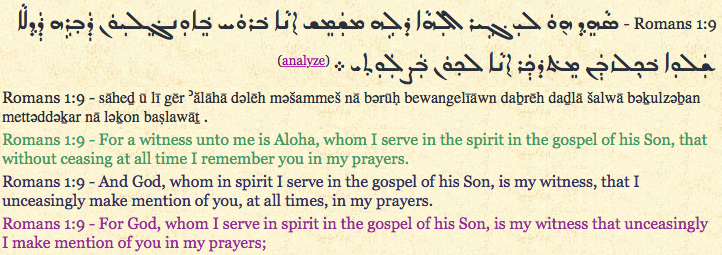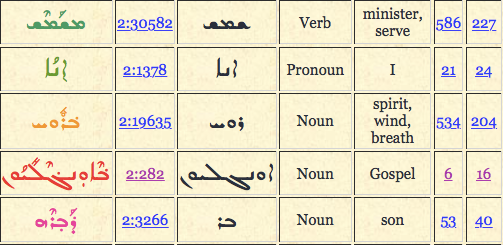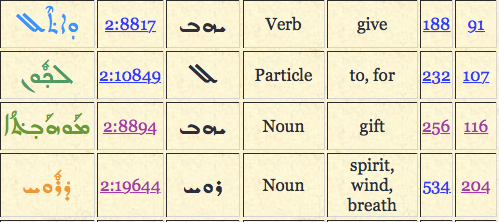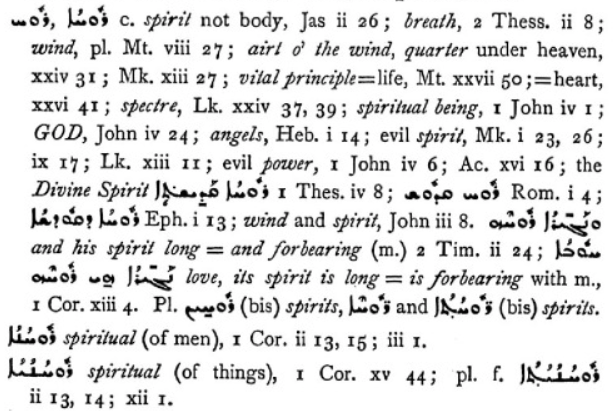In The Passion Translation of sections of the New Testament, Brian Simmons frequently claims in footnotes to have translated from the Aramaic text. For example he renders Romans 1.9 as:
with footnote:
The Greek text (NA 28) reads:
9 μάρτυς γάρ μού ἐστιν ὁ θεός, ᾧ λατρεύω ἐν τῷ πνεύματί μου ἐν τῷ εὐαγγελίῳ τοῦ υἱοῦ αὐτοῦ, ὡς ἀδιαλείπτως μνείαν ὑμῶν ποιοῦμαι
which almost demands to be translated along the lines of the ESV, for example:
‘For God is my witness, whom I serve with my spirit in the gospel of his Son, that without ceasing I mention you’
All 36 English translations at Bible Study Tools, including the Message Bible, translate τῷ εὐαγγελίῳ with ‘good news’ or ‘gospel’ or ‘glad tidings’. Simmons has ‘revelation’, which is a different idea. He says that he has translated from the Aramaic, so to the Aramaic we go, expecting to find a word closer to ‘revelation’ than ‘gospel’.
Simmons’ Aramaic text is the Syriac Peshitta. From his web-site:
while incorporating insights from the Syriac (Aramaic) Peshitta, as well as the Roth text.
The ‘Roth text’ Simmons refers to is the ‘Aramaic English New Testament‘ ‘compiled, edited and translated’ by Andrew Roth. It is an edition of the Peshitta, along with an English translation:
It does not make sense for Simmons to say that he incorporates insights from the Roth text in addition to the Peshitta. 1
So it is to the Peshitta we turn for our Aramaic text. I don’t know Aramaic so use the Peshitta tools at dukhrana.com. First of all, here is the Western UBS text, with transliteration and three English translations, by Etheridge (green), Murdock (navy), and Lamsa (purple):
The first thing most of us (who don’t know Aramaic) will notice is that all three translators have ‘gospel’ and not ‘revelation’. The more observant may be struck by the similarity between the transliterated word ‘bewangelīāwn’ and the Greek word εὐαγγέλιον meaning ‘gospel’. Clicking on the ‘analyze’ tool brings up the meaning of each word. Here are the words for the clause of interest:
Clicking on ‘2:282’ provides confirmation that the word for ‘Gospel’ is indeed the word that looks like εὐαγγέλιον:
The b’ suffix means ‘in’, in much the same way (I think) as בְּ does in Hebrew. The lexeme itself – which corresponds to the form of the word which appears in a lexicon (a dictionary) – is:
Clicking on ’16’ in the table above brings up the entry for this word in Jennings Lexicon to the Syriac New Testament:
It can be seen first that, although this is a Syriac to English lexicon, the meaning is given first in Greek because it is a loan word from Greek; and secondly that the meaning of εὐαγγέλιον, as said before, is ‘Gospel’. It can be seen also that Romans 1.9 is listed among the occurrences of the word, confirming that this is the Aramaic word used there.
Finally, the Peshitta tool at dukhrana.com has two alternative Peshitta text types, the Eastern and the Khabouris. I have checked these for Romans 1.9 and they both have the same word ܒܸ݁ܐܘܲܢܓܸ݁ܠܝܼܘܿ (bewangelīāwn), ‘in the gospel’.
My provisional conclusion then, subject to correction, is that Simmons’ rendering of Romans 1.9 is not in reality translated from the Aramaic as he claims. I have written to him for an explanation but not received one as yet.
Romans 1.11
Two verses later, there is an example of Simmons giving a rendition which actually does seem to derive from the Aramaic, as he claims. The Greek text (NA 28) of Romans 1.11 reads:
ἐπιποθῶ γὰρ ἰδεῖν ὑμᾶς, ἵνα τι μεταδῶ χάρισμα ὑμῖν πνευματικὸν εἰς τὸ στηριχθῆναι ὑμᾶς,
The ESV, as a typical example, has:
‘For I long to see you, that I may impart to you some spiritual gift to strengthen you’
and most versions (KJV, ASV, RSV, NIV, NASB etc) translate χάρισμα … πνευματικὸν (charisma pneumatikon) as ‘spiritual gift’, πνευματικός being the adjective from πνεῦμα, meaning ‘spirit’.
Simmons’ text however has ‘the gift of the Spirit’ instead of ‘some spiritual gift’:
He explains in a footnote that he has translated from the Aramaic:
The Peshitta tool shows that all three English translations have ‘gift of the Spirit’ rather than ‘spiritual gift’:
The analysis tool confirms that the Aramaic text has a noun meaning ‘spirit, wind, breath’ rather than an adjective:
It is not that Aramaic lacked an adjective meaning ‘spiritual’, as one such was used in 1 Corinthians 2.13, 15 and elsewhere, as can be seen from the definitions in Jennings:
It just seems to have been a change made by in the translation process from the Greek original to the Peshitta.
In this case, therefore Simmons seems to be justified in saying that he has translated from the Aramaic. As I said above, I am not here examining the question of why he would prefer the Peshitta reading to the original Greek text. (I have written to him twice on that point and not received a reply so far.)
What remains is to investigate whether Simmons’ apparently mistaken claim in Romans 1.9 is a one-off and so probably an inadvertent error, or whether there are more such claims which turn out to be apparently unfounded. In my next post I give further cases where Simmons’ text differs from normal versions, with no possible basis from the Greek text, and where he has claimed to be translating from the Aramaic, but where this claim turns out to be false, so far as I have been able to ascertain, to the best of my endeavour.
Andrew
Notes:
- On the basis of what I now know (June 2020), I am inclined to think that he was consulting Roth’s English translation. The current FAQs omit reference to the Roth text. ↩












2 Comments